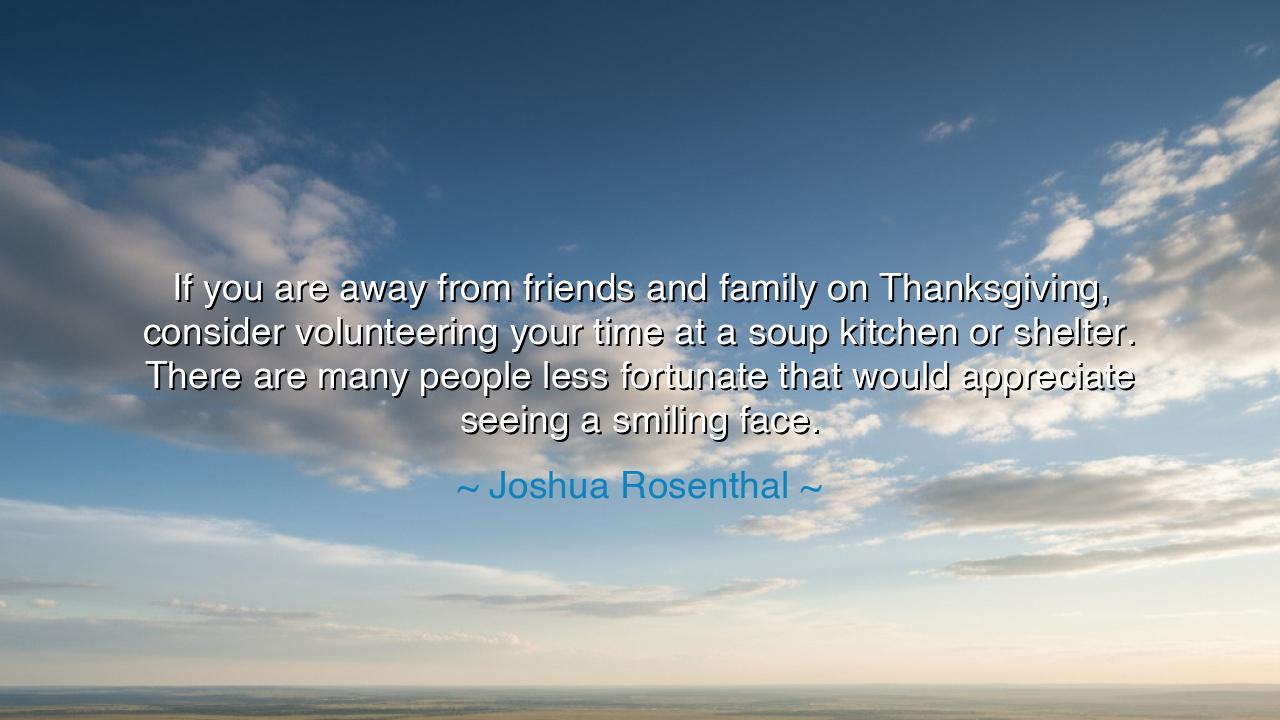
If you are away from friends and family on Thanksgiving
If you are away from friends and family on Thanksgiving, consider volunteering your time at a soup kitchen or shelter. There are many people less fortunate that would appreciate seeing a smiling face.






In the words of Joshua Rosenthal: “If you are away from friends and family on Thanksgiving, consider volunteering your time at a soup kitchen or shelter. There are many people less fortunate that would appreciate seeing a smiling face.” This saying calls us to remember the deeper purpose of the feast: not merely to eat, not merely to gather, but to embody gratitude through service. For what is Thanksgiving if not the recognition that life is a gift—and what is gratitude if it is not shared with others?
The ancients understood that festivals were not for the wealthy alone. The Greeks and Romans invited the poor to their banquets, the Hebrews were commanded to leave part of their harvest for the stranger, the orphan, and the widow. They knew that celebration without compassion becomes vanity, but when joy is shared with those in need, it becomes sacred. Rosenthal’s words echo this timeless wisdom: if the table of your own family is absent, then extend your hand to create another table, one of service, kindness, and light.
Consider the example of Dorothy Day, the 20th-century activist and founder of the Catholic Worker Movement. In the depths of the Great Depression, when millions were hungry, she established soup kitchens not just to feed bellies but to feed spirits. For her, every bowl of soup, every offered seat, was a proclamation of dignity: that no human being should be invisible, that a smiling face could heal as deeply as bread could nourish. Her life stands as a living testimony to Rosenthal’s call—that service transforms loneliness into belonging, and scarcity into abundance.
There is also a hidden strength in volunteering when one is far from home. Loneliness can weigh heavily on the heart, especially during times meant for togetherness. But in lifting the burdens of others, one discovers that the soul itself is lifted. The shelter and the soup kitchen become more than places of aid—they become sanctuaries where strangers are knit together in shared humanity. The one who serves and the one who is served are both healed, for compassion is a two-edged blessing.
Rosenthal reminds us, too, of humility. Not all have tables overflowing with food, not all have friends or family near. To acknowledge this truth is to see the world clearly, without illusion. But to respond to it with kindness, to bring joy to those who sit in shadows, is to live as the ancients taught: that the measure of a person is not in how much they receive, but in how much they give.
The lesson is plain: when separated from your own circle, do not dwell in sorrow, but turn your energy outward. Gratitude is multiplied when it becomes generosity. If you cannot be a guest at one table, then host another through service. Let your smiling face be the feast, your kindness the offering, and your time the gift that nourishes hearts as deeply as food nourishes the body.
Practical action lies before us all. Seek out a shelter, a soup kitchen, or a community center where you might serve. Carry with you not only food, but also warmth, patience, and dignity for those who come in need. If you cannot serve in person, then extend compassion in other ways: donate, call upon a neighbor, or send a note of encouragement. For every act of kindness, no matter how small, is a seed planted in the soil of gratitude.
Thus, Rosenthal’s words resound with ancient truth: Thanksgiving is not only for the fortunate, but for all. And when we lift our eyes from our own hunger to see the needs of others, we discover the feast is greater than any one table. For the true measure of gratitude is not in how much we have, but in how much we give—and in giving, we become the smiling face that brings light into another’s darkness.






AAdministratorAdministrator
Welcome, honored guests. Please leave a comment, we will respond soon